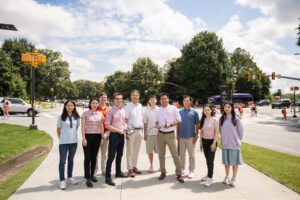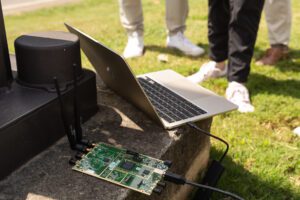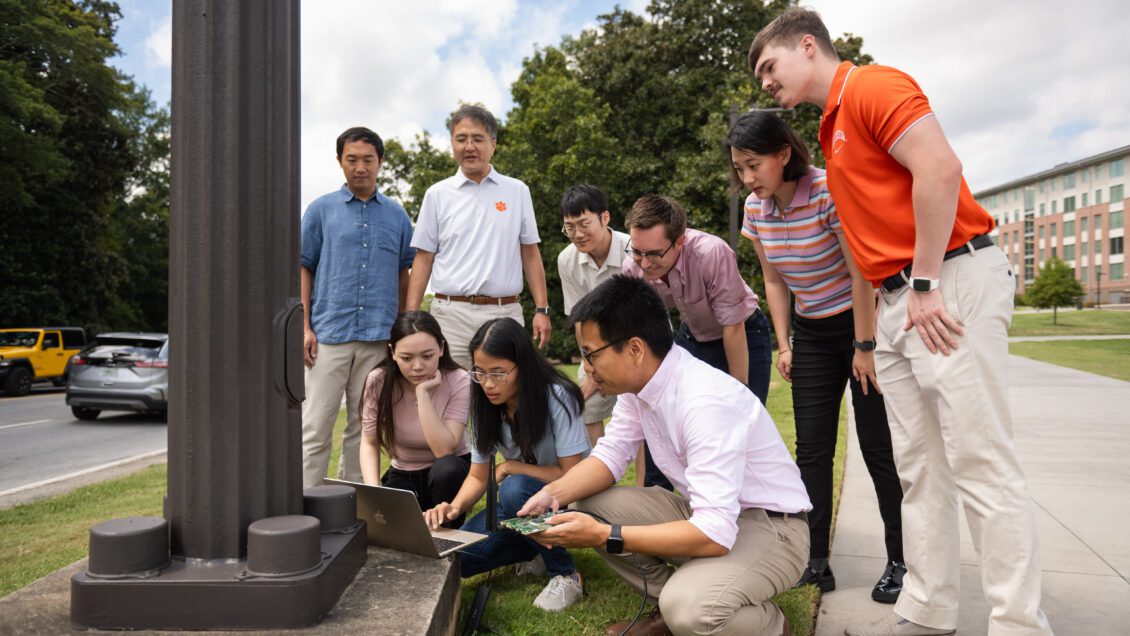Cameras positioned at a bustling intersection spot a pedestrian crossing the street as a self-driving car, out of sight around a curve, approaches in her direction.
To avoid a collision, data from the cameras has to be processed into actionable information that can be sent blazingly fast to the car, but how?

A group of Clemson University researchers led by Associate Professor Linke Guo said the answer could lie in edge computing, a new way of processing and moving data at lightning speed.
Edge computing gives the internet the ability to understand and interact with its immediate surroundings, without having to send large amounts of data to far-away computer centers.
The fates of several futuristic technologies hang in the balance as Clemson researchers work to break ground in the field. It could help make cities smarter, manufacturing more advanced and healthcare more connected, researchers said.
“Edge computing will be a key enabler of many technologies,” Guo said. “It’s a pivotal step toward creating a future that will result in applications that are faster, more efficient and more secure. I am excited about our work because we stand at the cusp of more seamlessly integrating data into our daily lives, which will come with a host of benefits.”
Edge computing would complement and improve on cloud computing, the current standard for sharing and processing data.
In cloud computing, data is stored on a centralized server, often hundreds of miles from application users, and they access it through computers, such as smartphones and laptops. For example, when someone streams a video on YouTube or Netflix, that’s the cloud at work.
But researchers said data is going to have to be processed faster to enable future technologies.
Every fraction of a second counts. For instance, if cameras take several seconds to send data about the pedestrian to the cloud, process it and relay the information to the car, the delay could spell disaster.

Edge computing aims to speed up the data processing by employing devices in the immediate vicinity of where the data is needed. Those devices could include everything from personal smartphones and connected cars to smart thermostats and local servers.
It’s called edge computing because data is stored and processed at the edge of the cloud without having to make the leap to the cloud.
The Clemson group is working to use a form of machine-learning artificial intelligence called federated learning to boost edge computing’s potential. Those algorithms would help devices involved in edge computing get smarter without sending data to a centralized server, making computing faster and more secure.
As part of their work, researchers are tackling the problem of heterogeneous data. Some devices have lots of data but missing pieces, while others have different strengths and speeds, making coordination a challenge. The Clemson group aims to develop a new system called Harmonious Federated Intelligence to get the devices working together.
Guo is working with Assistant Professor Xiaolong Ma, Associate Professor Jon Calhoun, Professor Tao Wei and K.C. Wang, professor and the C. Tycho Howle Endowed Chair. All are on the faculty of the Holcombe Department of Electrical and Computer Engineering.
They are receiving funding for their work through the National Science Foundation. Among their partners is Xiaonan Zhang, who is Guo’s former Ph.D. student and is now an assistant professor of computer science at Florida State University.
Several students are also involved in the research, helping shape the future edge-computing workforce.
“I’m really interested in machine learning,” said Ruiwen Shan, a Ph.D. student in Calhoun’s group. “It’s a hot topic these days, but I haven’t had a chance until now to look deep into it. This will be a great experience for me.”
Get in touch and we will connect you with the author or another expert.
Or email us at news@clemson.edu

